Hotspots and research trends of gut microbiome in polycystic ovary syndrome: a bibliometric analysis (2012-2023)
- PMID: 39845049
- PMCID: PMC11753182
- DOI: 10.3389/fmicb.2024.1524521
Hotspots and research trends of gut microbiome in polycystic ovary syndrome: a bibliometric analysis (2012-2023)
Abstract
Introduction: Polycystic ovary syndrome (PCOS) is a common gynecological condition affecting individuals of reproductive age and is linked to the gut microbiome. This study aimed to identify the hotspots and research trends within the domain of the gut microbiome in PCOS through bibliometric analysis.
Methods: Utilizing bibliometric techniques, we examined the literature on the gut microbiome in PCOS from the Web of Science Core Collection spanning the period from 2012 to 2023. Analytical tools such as CiteSpace, VOSviewer, and Bibliometric R packages were employed to evaluate various metrics, including countries/regions, institutions, authors, co-cited authors, authors' H-index, journals, co-references, and keywords.
Results: A total of 191 publications were identified in the field of gut microbiome in PCOS, with an increase in annual publications from 2018 to 2023. People's Republic of China was the most productive country, followed by the United States of America (USA), India. Shanghai Jiao Tong University, Fudan University, and Beijing University of Chinese Medicine were the top three most publications institutions. Thackray VG was identified as the most prolific author, holding the highest H-index, while Liu R received the highest total number of citations. The journal "Frontiers in Endocrinology" published the most articles in this domain. The most frequently co-cited reference was authored by Qi XY. The analysis of keyword burst detection identified "bile acids" (2021-2023) as the leading frontier keyword. Additionally, "gut dysbiosis," "phenotypes," "adolescents," "metabolomics," "metabolites," "fecal microbiota transplantation," and "IL-22" have emerged as the primary keywords reflecting recent research trends.
Conclusion: This bibliometric analysis explores how the gut microbiome influences endocrine and metabolic disorders related to PCOS, emphasizing its role in the development of PCOS and treatments targeting the gut microbiome. The findings serve as a valuable resource for researchers, enabling them to identify critical hotspots and emerging areas of investigation in this field.
Keywords: CiteSpace; VOSviewer; bibliometric; gut microbiome; pathogenesis; polycystic ovary syndrome (PCOS); treatment.
Copyright © 2025 Wu, Mai, Song and Zhao.
Conflict of interest statement
The authors declare that the research was conducted in the absence of any commercial or financial relationships that could be construed as a potential conflict of interest.
Figures

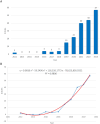
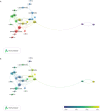
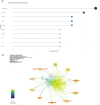
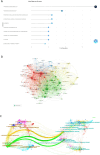
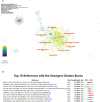

References
-
- Abdulkhalikova D., Sustarsic A., Vrtacnik Bokal E., Jancar N., Jensterle M., Burnik Papler T. (2022). The lifestyle modifications and endometrial proteome changes of women with polycystic ovary syndrome and obesity. Front Endocrinol (Lausanne) 13:888460. doi: 10.3389/fendo.2022.888460, PMID: - DOI - PMC - PubMed
-
- Angoorani P., Ejtahed H. S., Ettehad Marvasti F., Taghavi M., Mohammadpour Ahranjani B., Hasani-Ranjbar S., et al. (2023). The effects of probiotics, prebiotics, and synbiotics on polycystic ovarian syndrome: an overview of systematic reviews. Front Med (Lausanne) 10:1141355. doi: 10.3389/fmed.2023.1141355, PMID: - DOI - PMC - PubMed
-
- Aria M., Cuccurullo C. (2017). Bibliometrix: An R-tool for comprehensive science mapping analysis. J. Informet. 11, 959–975. doi: 10.1016/j.joi.2017.08.007 - DOI
Publication types
LinkOut - more resources
Full Text Sources

